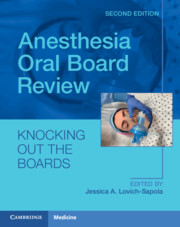Book contents
- Anesthesia Oral Board Review
- Anesthesia Oral Board Review
- Copyright page
- Contents
- Contributors
- Acknowledgments
- Letter from the Associate Editor
- How to Use This Book
- Format
- Applied Exam Tips for Success
- Part I General Information
- Part II Anesthetic-Related Critical Events and Information
- Section 1 Respiratory, Airway, and Ventilator Management
- Section 2 Cardiac, Thoracic, and Vascular Anesthesia
- Section 3 Neuroanesthesia
- Section 4 Renal and Urological
- Section 5 Hepatic and Gastrointestinal
- Section 6 Obstetric Anesthesia
- Section 7 Pediatric Anesthesia
- Section 8 Endocrine
- Section 9 Trauma Anesthesia
- Chapter 74 Rapid-Sequence Intubation
- Chapter 75 Cervical Spine Precautions
- Chapter 76 Head Trauma
- Chapter 77 Eye Trauma
- Chapter 78 The Pregnant Trauma Patient
- Chapter 79 Burn Anesthesia
- Section 10 Emergency Events
- Section 11 Organ Transplant
- Section 12 Post-Anesthesia Care Unit
- Section 13 Acute and Chronic Pain
- Section 14 Other Situations
- Section 15 Safety and Ethics
- Index
- References
Chapter 76 - Head Trauma
from Section 9 - Trauma Anesthesia
Published online by Cambridge University Press: 03 August 2023
- Anesthesia Oral Board Review
- Anesthesia Oral Board Review
- Copyright page
- Contents
- Contributors
- Acknowledgments
- Letter from the Associate Editor
- How to Use This Book
- Format
- Applied Exam Tips for Success
- Part I General Information
- Part II Anesthetic-Related Critical Events and Information
- Section 1 Respiratory, Airway, and Ventilator Management
- Section 2 Cardiac, Thoracic, and Vascular Anesthesia
- Section 3 Neuroanesthesia
- Section 4 Renal and Urological
- Section 5 Hepatic and Gastrointestinal
- Section 6 Obstetric Anesthesia
- Section 7 Pediatric Anesthesia
- Section 8 Endocrine
- Section 9 Trauma Anesthesia
- Chapter 74 Rapid-Sequence Intubation
- Chapter 75 Cervical Spine Precautions
- Chapter 76 Head Trauma
- Chapter 77 Eye Trauma
- Chapter 78 The Pregnant Trauma Patient
- Chapter 79 Burn Anesthesia
- Section 10 Emergency Events
- Section 11 Organ Transplant
- Section 12 Post-Anesthesia Care Unit
- Section 13 Acute and Chronic Pain
- Section 14 Other Situations
- Section 15 Safety and Ethics
- Index
- References
Summary
A 40-year-old man presents to the trauma bay after a prolonged extrication, following an ATV accident. He is intoxicated, incoherent, and combative. The trauma team would like to sedate the patient for a CT scan to evaluate his head, abdomen, and pelvis. The patient’s blood pressure is 170/90 mm Hg, heart rate is 48 beats/min, and temperature is 35.5 °C. What are your concerns in a traumatic brain injury (TBI) patient? How will you evaluate the patient? How will you induce and maintain general anesthesia in this patient?
- Type
- Chapter
- Information
- Anesthesia Oral Board ReviewKnocking Out The Boards, pp. 316 - 319Publisher: Cambridge University PressPrint publication year: 2023



